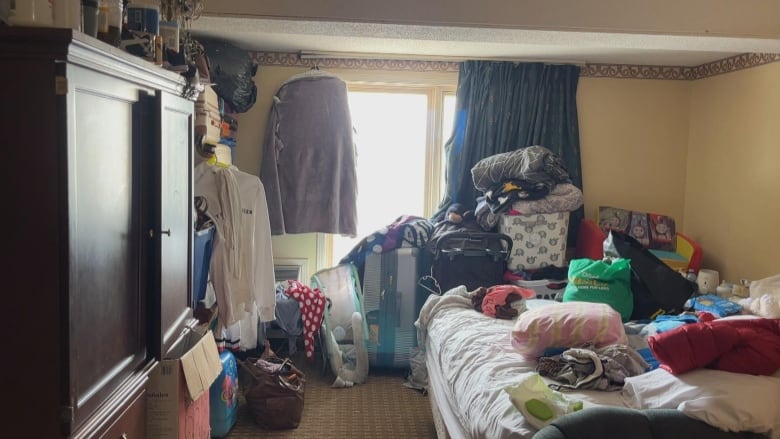Grieving mother blames unsanitary living conditions at motel shelter in toddler's death
Owner of Travelodge says 'no reason to believe' conditions contributed to death

A grieving mother believes unsanitary living conditions at the Ottawa motel where she and her five children were placed to live last summer contributed to the death of her two-year-old son earlier this month.
Gloria Luhaka, who fled violence in the Democratic Republic of the Congo, has been living with her five children — including twin toddlers — at the Travelodge by Wyndham Ottawa West on Carling Avenue for the past seven months.
The City of Ottawa placed the family at the motel, which is among sites the city uses when shelters are full. Like many who have stayed at such motels, Luhaka does not believe the accommodations meet basic health or hygiene standards.
"I share my food with the mice. I share the milk of my son with the mice," Luhaka said in a French interview on Tuesday.
"Where is the Canada I risked my life to come to?"
Radio-Canada toured the Travelodge and Luhaka's two adjoining rooms on Tuesday.
Conditions were not typical for a chain hotel — including an exterior window that could not close completely, a space heater to compensate for a lack of in-room heat, a mouse trap containing a dead mouse and insect, exposed insulation in the ceiling, dirty carpets in the rooms and in the hallways, stains on the walls of the hotel and a strong, foul odour in the air.

Conditions likely contributed to toddler's illness: CHEO
Luhaka's two-year-old son Brantly was admitted to CHEO, eastern Ontario's children's hospital in Ottawa, with breathing problems on Feb. 26. An email shared with CBC from a hospital social worker, and addressed to River Coun. Riley Brockington, said the child contracted five viruses and eight different types of bacteria.
The toddler died in hospital March 8 — 10 days after he was admitted — the family said through a spokesperson.
"Although it is unclear if Brantly's living conditions caused his illness (autopsy results are forthcoming), there is a high probability the environmental factors of the family's living space contributed to Brantly's illness," read the letter dated March 14 from the CHEO social worker.
"He was a previously healthy child with no known medical issues or conditions."
Wiping away tears, Luhaka told reporters on Tuesday her son followed her everywhere, as he couldn't stand to be away from her even for a few minutes.
"Brantly, he was mommy's son," she said. "Where are Brantly's rights?"
WATCH | Luhaka talks about the motel:
Motel denies link to toddler's death
Robert Sherman, chief operating officer with the motel's owner Holloway Lodging Corporation, said the company is working with the City of Ottawa and Ottawa Public Health to ensure it is compliant with "all applicable regulations and with the expectations of authorities."
"We have no reason to believe the living conditions provided by the hotel contributed to this tragic event," wrote Sherman in an email to CBC.
Sherman acknowledged the hotel has a "pest issue" and said the company has hired a pest control company. He added the company is also aware of maintenance needs, which are being addressed.

The city, which placed the family at the hotel, said it will investigate conditions at the Travelodge.
Paul Lavigne, interim director of housing, said city staff will speak with affected families and work with partners to "ensure any concerns are identified and addressed."
The city is also providing grief and mental health support along with financial assistance to Luhaka's family, Lavigne said in a written response to CBC.
Many 'Glorias' in Ottawa, advocate says
In 2019, the city's then-auditor general Ken Hughes urged Ottawa to stop using motels and look for less expensive arrangements for short-term housing.
At the time, Ottawa paid an average of $3,000 per month to house a family in a motel, well above market prices for similar rental accommodations.
Brockington. whose ward includes the Travelodge, told CBC most motel rooms are simply not equipped to house a family for longer stays — many of the suites, including Luhaka's room, lack any type of kitchen, as one example.
"They may have a microwave and a very small fridge but they don't have the ability to cook meals," he said.

Hector Addison, executive director of the African Canadian Association of Ottawa, said Luhaka's family is far from unique in Ottawa.
"There are many Glorias all across the city," he said.
"Transition homes are supposed to be temporary but oftentimes what we see in the city is that some people have been living in motels for six, seven years."
Addison is calling on the city to expand its partnerships with various local groups to build more affordable housing. The plan, he said, would not only provide better accommodations for families but would also save money in the long run.
With files from Kate Porter and Radio-Canada's Patrick Foucault


